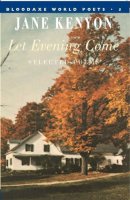Book Review: Jane Kenyon, Let Evening Come: Selected Poems
reviewed by anna battista

We should thank Bloodaxe for this collection of poems by Jane Kenyon, which makes finally available for readers in Britain and Ireland the works of such a talented poet and writer. The anthology includes poems from different collections by Jane Kenyon, such as From Room to Room (1978), The Boat of Quiet Hours (1986), Let Evening Come (1990), Constance (1993), Otherwise (1996), and Twenty Poems of Anna Akhmatova (1985), the latter translated from the Russian with scholar Vera Sandomirsky Dunham. Other material included in the book is an interview with Jane Kenyon, but also two introductions, the former by her friend Joyce Peseroff, the latter by her husband Donald Hall.
Kenyon (1947-1995) wrote throughout her life moving and heart-breaking poems that show her attention for detail. The simplest things become small miracles in her works: the geranium spies over her shoulder to see if she's writing about it; a bat suddenly appearing in her house becomes a manifestation of the Holy Ghost; finding a long gray hair while scrubbing the floor of her house is a hieratical experience that makes her think to all the women who scrubbed those floors before her.
The world of Eagle Pond Farm, where Kenyon moved with her husband in 1975, is often present in the poems, as the natural world, the outside world, is often used by Kenyon in her works, perhaps as a way to talk about an inner dimension. Yet there are other themes in these works, such as depression from which she suffered for a long time ('Having It Out with Melancholy'; 'Back'), nursing her ill father ('Reading Aloud to My Father'), her love for Akhmatova and Keats ('Lines for Akhmatova'; 'At the Spanish Steps in Rome'). In her poems Kenyon often uses Eliot's objective correlative, an object that embodies what she is feeling, like in her poem 'Coats' in which she sees a man coming out of a hospital wearing a coat even though outside is not too cold, and carrying a woman's coat over his arm. It's a short poem, but behind its three stanzas, behind the symbol of the coat, there is all the pain of somebody who has lost his wife. This is pure Jane Kenyon who, by meditating on the things she sees, finds the truth about life.
Poems are indeed a way to reach the truth: when in the interview included in the book David Bradt asks her why poetry matters, Kenyon answers "because it tells the truth, the human truth about the complexity of life … It tells the entire truth about what it is to be alive, about the way of the world, about life and death." Let Evening Come is Jane Kenyon at her best, a collection of introverted poems posing questions about human existence and the joys and pains of life.
Copyright (c) 2005 erasing clouds |
|